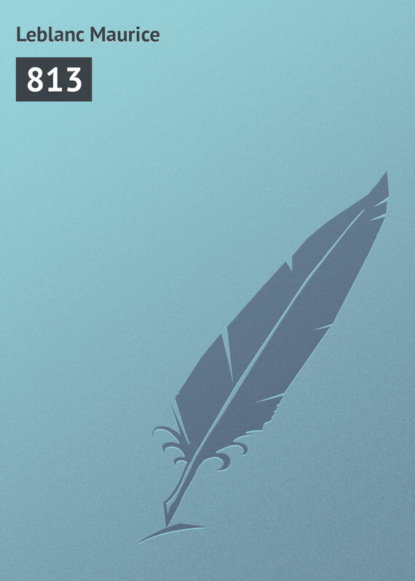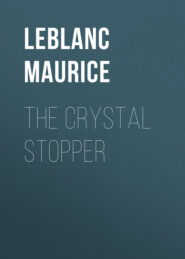По всем вопросам обращайтесь на: info@litportal.ru
(©) 2003-2025.
✖
813
Настройки чтения
Размер шрифта
Высота строк
Поля
"I did think of it, Sire," replied Lupin, calmly. The stranger's merriment increased:
"Splendid! And you let me off?"
"This time, yes."
Lupin had crossed his arms. He, too, was amusing himself by exaggerating the part which he was playing; and he continued, with affected seriousness:
"A series of circumstances might one day arise which would put in my hands the power of demanding and obtaining that restitution. When that day comes, I shall certainly not fail to do so. For the moment, the weapons at my disposal oblige me to be more modest. Peace in Morocco will satisfy me."
"Just that?"
"Just that."
"Morocco against your liberty!"
"Nothing more.. or, rather – for we must not lose sight entirely of the main object of this conversation – or, rather, a little good will on the part of one of the countries in question.. and, in exchange, the surrender of the letters which are in my power."
"Those letters, those letters!" muttered the stranger irritably. "After all, perhaps they are not so valuable.."
"There are some in your own hand, Sire; and you considered them valuable enough to come to this cell.."
"Well, what does it matter?"
"But there are others of which you do not know the authorship and about which I can give you a few particulars."
"Oh, indeed!" said the stranger, rather anxiously.
Lupin hesitated.
"Speak, speak plainly," said the stranger. "Say what you have in your mind."
In the profound silence of the cell, Lupin declared, with a certain solemnity:
"Twenty years ago a draft treaty was prepared between Germany, Great Britain, and France."
"That's not true! It's impossible! Who could have done such a thing?"
"The Emperor's father and the Queen of England, his grandmother, both acting under the influence of the Empress Frederick."
"Impossible! I repeat, it is impossible!"
"The correspondence is in the hiding-place at Veldenz Castle; and I alone know the secret of the hiding-place."
The stranger walked up and down with an agitated step. Then he stopped short:
"Is the text of the treaty included in that correspondence?"
"Yes, Sire. It is in your father's own hand."
"And what does it say?"
"By that treaty, France and Great Britain granted and promised Germany an immense colonial empire, the empire which she does not at present possess and which has become a necessity to her, in these times, to ensure her greatness."
"And what did England demand as a set-off against that empire?"
"The limitation of the German fleet."
"And France?"
"Alsace and Lorraine."
The Emperor leant against the table in silent thought. Lupin continued:
"Everything was ready. The cabinets of Paris and London had been sounded and had consented. The thing was practically done. The great treaty of alliance was on the point of being concluded. It would have laid the foundations of a definite and universal peace. The death of your father destroyed that sublime dream. But I ask Your Imperial Majesty, what will your people think, what will the world think, when it knows that Frederick III., one of the heroes of 1870, a German, a pure and loyal German, respected by all, generally admired for his nobility of character, agreed to the restitution of Alsace-Lorraine and therefore considered that restitution just?"
He was silent for an instant leaving the problem to fix itself in its precise terms before the Emperor's conscience, before his conscience as a man, a son and a sovereign. Then he concluded:
"Your Imperial Majesty yourself must know whether you wish or do not wish history to record the existence of that treaty. As for me, Sire, you can see that my humble personality counts for very little in the discussion."
A long pause followed upon Lupin's words. He waited, with his soul torn with anguish. His whole destiny was at stake, in this minute which he had conceived and, in a manner, produced with such effort and such stubbornness, an historic minute, born of his brain, in which "his humble personality," for all that he might say, weighed heavily upon the fate of empires and the peace of the world.
Opposite him, in the shadow, Cæsar stood meditating.
What answer would he make? What solution would he give to the problem?
He walked across the cell for a few moments, which to Lupin seemed interminable. Then he stopped and asked:
"Are there any other conditions?"
"Yes, Sire, but they are insignificant."
"Name them."
"I have found the son of the Grand-duke of Zweibrucken-Veldenz. The grand-duchy must be restored to him."
"Anything else?"
"He loves a young girl, who loves him in her turn. She is the fairest and the most virtuous of her sex. He must marry her."
"Anything else?"
"That is all."
"There is nothing more?"
"Nothing. Your majesty need only have this letter delivered to the editor of the Grand Journal, who will then destroy, unread, the article which he may now receive at any moment."
Lupin held out the letter, with a heavy heart and a trembling hand. If the Emperor took it, that would be a sign of his acceptance.
"Splendid! And you let me off?"
"This time, yes."
Lupin had crossed his arms. He, too, was amusing himself by exaggerating the part which he was playing; and he continued, with affected seriousness:
"A series of circumstances might one day arise which would put in my hands the power of demanding and obtaining that restitution. When that day comes, I shall certainly not fail to do so. For the moment, the weapons at my disposal oblige me to be more modest. Peace in Morocco will satisfy me."
"Just that?"
"Just that."
"Morocco against your liberty!"
"Nothing more.. or, rather – for we must not lose sight entirely of the main object of this conversation – or, rather, a little good will on the part of one of the countries in question.. and, in exchange, the surrender of the letters which are in my power."
"Those letters, those letters!" muttered the stranger irritably. "After all, perhaps they are not so valuable.."
"There are some in your own hand, Sire; and you considered them valuable enough to come to this cell.."
"Well, what does it matter?"
"But there are others of which you do not know the authorship and about which I can give you a few particulars."
"Oh, indeed!" said the stranger, rather anxiously.
Lupin hesitated.
"Speak, speak plainly," said the stranger. "Say what you have in your mind."
In the profound silence of the cell, Lupin declared, with a certain solemnity:
"Twenty years ago a draft treaty was prepared between Germany, Great Britain, and France."
"That's not true! It's impossible! Who could have done such a thing?"
"The Emperor's father and the Queen of England, his grandmother, both acting under the influence of the Empress Frederick."
"Impossible! I repeat, it is impossible!"
"The correspondence is in the hiding-place at Veldenz Castle; and I alone know the secret of the hiding-place."
The stranger walked up and down with an agitated step. Then he stopped short:
"Is the text of the treaty included in that correspondence?"
"Yes, Sire. It is in your father's own hand."
"And what does it say?"
"By that treaty, France and Great Britain granted and promised Germany an immense colonial empire, the empire which she does not at present possess and which has become a necessity to her, in these times, to ensure her greatness."
"And what did England demand as a set-off against that empire?"
"The limitation of the German fleet."
"And France?"
"Alsace and Lorraine."
The Emperor leant against the table in silent thought. Lupin continued:
"Everything was ready. The cabinets of Paris and London had been sounded and had consented. The thing was practically done. The great treaty of alliance was on the point of being concluded. It would have laid the foundations of a definite and universal peace. The death of your father destroyed that sublime dream. But I ask Your Imperial Majesty, what will your people think, what will the world think, when it knows that Frederick III., one of the heroes of 1870, a German, a pure and loyal German, respected by all, generally admired for his nobility of character, agreed to the restitution of Alsace-Lorraine and therefore considered that restitution just?"
He was silent for an instant leaving the problem to fix itself in its precise terms before the Emperor's conscience, before his conscience as a man, a son and a sovereign. Then he concluded:
"Your Imperial Majesty yourself must know whether you wish or do not wish history to record the existence of that treaty. As for me, Sire, you can see that my humble personality counts for very little in the discussion."
A long pause followed upon Lupin's words. He waited, with his soul torn with anguish. His whole destiny was at stake, in this minute which he had conceived and, in a manner, produced with such effort and such stubbornness, an historic minute, born of his brain, in which "his humble personality," for all that he might say, weighed heavily upon the fate of empires and the peace of the world.
Opposite him, in the shadow, Cæsar stood meditating.
What answer would he make? What solution would he give to the problem?
He walked across the cell for a few moments, which to Lupin seemed interminable. Then he stopped and asked:
"Are there any other conditions?"
"Yes, Sire, but they are insignificant."
"Name them."
"I have found the son of the Grand-duke of Zweibrucken-Veldenz. The grand-duchy must be restored to him."
"Anything else?"
"He loves a young girl, who loves him in her turn. She is the fairest and the most virtuous of her sex. He must marry her."
"Anything else?"
"That is all."
"There is nothing more?"
"Nothing. Your majesty need only have this letter delivered to the editor of the Grand Journal, who will then destroy, unread, the article which he may now receive at any moment."
Lupin held out the letter, with a heavy heart and a trembling hand. If the Emperor took it, that would be a sign of his acceptance.











